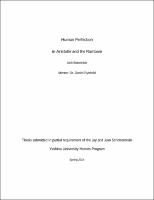Please use this identifier to cite or link to this item:
https://hdl.handle.net/20.500.12202/4106| Title: | Human Perfection in Aristotle and the Rambam |
| Authors: | Botwinick, Josh |
| Keywords: | Maimonides, Moses, 1135-1204. Moreh nevukhim. Aristotle. Nicomachean ethics. Aristotle --Influence. Perfection --Religious aspects --Judaism. Philosophy, Medieval. |
| Issue Date: | 2014 |
| Publisher: | Yeshiva College |
| Abstract: | What makes a human perfect? Beyond merely being a fascinating question to discuss, the notion of what makes a perfect human being should presumably determine how a person should live one’s life. In order to strive for a life of perfection, one needs first to understand what it means to be a perfect human being. In his work Nichomachean Ethics, Aristotle attempts to answer this question. Oddly, Aristotle appears to contradict himself in the conclusion of this work. Resolving the apparent contradiction in the Ethics remains the subject of much debate and scholarship. Fourteen centuries after Aristotle lived, the Jewish thinker Rabbi Moshe Ben Maimon revisited this same question. His discussion of this issue takes up a large portion of his celebrated work, The Guide of the Perplexed. As a religious thinker, it might be expected that the Rambam would draw his answer directly and solely from the Bible or Rabbinic sources. Yet interestingly, the discussion in the Guide regarding human perfection follows the same structure as the discussion in Aristotle’s Nichomachean Ethics. The Rambam’s approach to the issue is clearly influenced by Aristotle’s work. Yet, despite working with the same approach as Aristotle does, the Rambam seems to reach a different conclusion. In this thesis we will analyze where exactly the Rambam veers away from Aristotle’s position, and why he chooses to do so. We will argue that despite basing his argument mostly on Aristotle’s thought, the Rambam’s religious perspective does indeed lead him to a different conclusion. The logical argument of the Guide may take the same form as that in the Ethics, but the Rambam’s difference in world view leads him to a different conclusion regarding what makes a human perfect. |
| Description: | The file is restricted for YU community access only. |
| URI: | https://hdl.handle.net/20.500.12202/4106 https://ezproxy.yu.edu/login?url=https://repository.yu.edu/handle/20.500.12202/4106 |
| Appears in Collections: | Jay and Jeanie Schottenstein Honors Student Theses |
Files in This Item:
| File | Description | Size | Format | |
|---|---|---|---|---|
| Josh-Botwinick.pdf Restricted Access | 381.78 kB | Adobe PDF |  View/Open |
This item is licensed under a Creative Commons License

